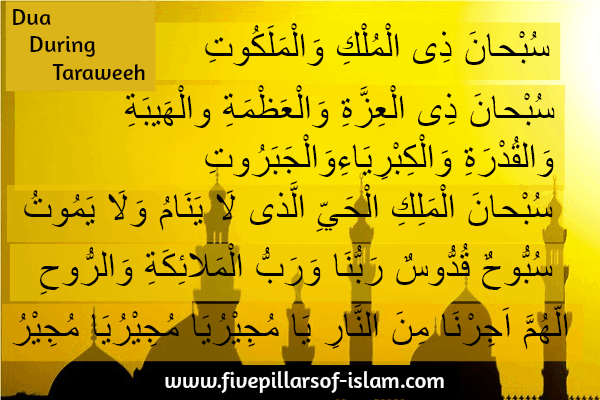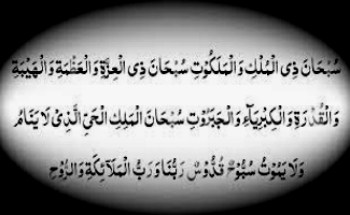You may ask us anything and we will try to solve your problem according to Islam and sharia. You have to write it with details in below and send it.
[contact-form][contact-field label=”Name” type=”name” required=”1″][contact-field label=”Email” type=”email” required=”1″][contact-field label=”Message” type=”textarea” required=”1″][/contact-form]Online Fatwa
You May Ask Anything We Shall Solve Your Problem.
Taraweeh Dua [Everything You Need To Know!]
Taraweeh Dua – Today We Are Going To Explain to You How To Do Taraweeh Properly, You Can Also Share This To Your Family And Friends!
السؤال
ما حكم التسبيح و الأذكار التي بعد كل ركعتين في صلاة التراويح؟ هل يجب قولها أو لا؟ إذا كان الشيخ لا يريد قولها فماذا علينا أن نفعل؟ هل نتبعه أو
نخالفه؟
What is the ruling on tasbeeh and takbeer after every two rak’ahs in Taraweeh prayer? Should we say it or not? If the Shaykh does not want to say what should we do? Do we follow him or disagree with him?
الإجابة
الحمدُ للهِ، والصلاةُ والسلامُ على رسولِ اللهِ، وعلى آلِهِ وصحبِهِ ومن والاهُ،
أمَّا بعدُ: فقد حث الشرع على الذكر عمومًا في جميع الأوقات؛ قال الله تعالى: {فَاذْكُرُونِي أَذْكُرْكُمْ} [البقرة: 152].
وقال تعالى: {الَّذِينَ يَذْكُرُونَ اللَّهَ قِيَاماً وَقُعُوداً وَعَلَى جُنُوبِهِمْ وَيَتَفَكَّرُونَ فِي خَلْقِ السَّمَاوَاتِ وَالْأَرْضِ رَبَّنَا مَا خَلَقْتَ هَذَا بَاطِلاً سُبْحَانَكَ فَقِنَا عَذَابَ النَّارِ} [آل عمران:191].
أما تخصيص ذكر معين بصلاة التراويح بين كل ركعتين، فلم يرد عن النبي صلى الله عليه وسلم فقد ثبت أنه صلى بالصحابة عدة ليال من رمضان، ولم ينقل عنه شيء من هذا، مع توافر الهمم على نقل مثله، وكذلك لم ينقل عن أحد من الصحابة الذين جمعهم عمر بن الخطاب على أبي بن كعب، فقد نقل عنهم تفاصيل صلاة التراويح، من عدد الركعات، والقنوت، إلى غير ذلك، ولم يرد أنهم سبَّحوا تلك التسبيحات،والصحابة بلا شك أحرص الناس على الخير، فلو كان هذا خيرًا، لسبقونا إليه،
ولكن إن كان المصلي يواظب على ذكر الله في نفس في جميع الأوقات والأحوال، وأراد أن يذكر الله في نفسه، ويسبحه بين الركعات، كغيره من الأوقات ولا فرق، فلا بأس بذلك، شريطة أن يكون سرٍّا، ولا يلتزم ذكرًا معينًا ولا هيئة معينة، كأن يكون بصورة جماعية، أو أن يذكر الإمام، ويردد المصلون خلفه، أو بصوت مرتفع، بحيث يشوش على المصلين، فإن حدث ذلك، فقد وقع في البدعة المنهي عنها.
قال في “المدخل” (2 / 457):” (فصل في الذكر بعد التسليمتين من صلاة التراويح)”. وينبغي له أن يتجنب ما أحدثوه من الذكر بعد كل تسليمتين من صلاة التراويح، ومن رفع أصواتهم بذلك، والمشي على صوت واحد، فإن ذلك كله من البدع، وكذلك يُنهى عن قول المؤذن بعد ذكرهم بعد التسليمتين من صلاة التراويح: الصلاة يرحمكم الله فإنه محدث -أيضًا- والحدث في الدين ممنوع،
وخير الهدي، هدي محمد صلى الله عليه وسلم ثم الخلفاء بعده، ثم الصحابة رضوان الله عليهم أجمعين ولم يُذكر عن أحد من السلف أنهم فعلوا ذلك، فيسعنا ما وسعهم”. انتهـى.
وعليه: فالتسبيح بين ركعات صلاة التراويح من البدع، فلا يجوز فعلها، ولا يجوز للمأمومين اتباع أئمة المساجد الذين يفعلونها، بل تجب مخالفتهم، ونصحهم برفق وحكمة بالحرص على السنة، وترك البدعة، فإن استجابوا وإلا بحث المصلي عن مسجد آخر يقيم السنة، فإن لم يجد صلى معهم ولا يشاركهم في تلك البدعة، وإذا كان الشيخ لا يريد قولها – كما يقول السائل– فلتتبعوه على هذا؛ لأن الظاهر أنه يمتنع لأنه أمر محدث،، والله أعلم
All Praises to Allah, and All prayers and peace be upon the Messenger of Allah, and on his family and companions and his parents,
The Sharia urged to mention ALLAH (doing Dhikr) generally at all times; ALLAH said: (Remember me I’ll remind you) [Baqarah: 152]. The Almighty ALLAH said, “Those who remember ALLAH standing and sitting and lying on their sides and think in (ponder on) the creation of the heavens and the earth, {and say}, “Our Lord you have not created all this in vain.We proclaim your purity, So save us from the punishment of fire. [Al-Imran: 191].
The Prophet (peace and blessings of Allaah be upon him) did not say, however he offered taraweeh prayer with the Sahaabah for several nights of Ramadaan and he motivated his people (sahaba) time to time for supplications and dua but neither he taught any of taraweeh dua, nor any of the Sahaabah in those of whom Omar bin al-Khattab brought together in the leadership of Ubai bin Ka’b told about any kind of these dua. They,also,narrated the details of Taraweeh prayer,the number of rak’aats and dua for qunoot etc. but it’s not recorded that they praised any time with these words or any other words like this.
If anyone continuously remembers Allah and does Dhikr by his heart at all times and in all circumstances and wants to remind Allah during the period of Taraweeh or between the rak’ah so thois is permissble and nothing is wrong with this, but secretely , and does not follow any particular dhikr with specific body, and not in any jama’at with others, or follow the words that mentions imam, or by repeating behind imam’s words, or with a loud voice, so that it disturbs others, So, it was signed in the heresy.
The writer of Al-Madkhal said in his book, ” He should avoid what they have created themselves in the form of mentioning after every two rakah Taraaweeh prayers loudely by raising their voices and following one voice this is all bid’ah, and it is, also, forbidden to say the muazzin after tasleem of taraweeh, Assaltu yarhamukum Allah.The best way is the way of the Prophet (peace and blessings of Allaah be upon him) then the caliphs after him, and then his Companions, (may Allah be pleased with them all) but nobody mentioned among them and not any of the Salaf that kind of dhikr, so we should do what they did.
SAWM: Important Fatwas About Fasting
Sawm, important fatwas about fasting in 2018. Here is the list of fatwa on fasting. Just check the below mentioned fasts and post your suggestion in the comment section.
(1) While performing ablution (wudhu) in fasting, if thread like particles of miswak goes into my throat, then the fast will be valid or broken?
(2) While performing ablution (wudhu) in fasting, if thread like particles of miswak goes into my throat and by making effort I spit out some of the particles, then the fast will be valid or broken?
ANSWER
(1, 2) Fast will break if one uses miswak in the state of fast and swallows the particles of miswak intentionally and qaza is necessary whether the particles are less or more. However if one or two particles of miswak enter down the throat without intention then fast will not be invalid as it is not possible to avoid it.
(هنديه : 1/265 كتاب الصوم / الباب الرابع فيما يفسد وما لا يفسد ط: زكريا)
Read About Lailatul Qadr
(3) I have chronic kidney stones problem. For last 12 years I am suffering with this issue and passed through couple of stones. In last 9 years I have had 4 surgical operations to remove these stones and related issues. The last operation I just had end of this March 2017 and not going to my work for last 2 months.
I still have 6 mm stone in my left kidney. I should need to consume 2 to 3 litter water every day. Dehydration is not good for my kidney stones problem. Could you please tell me that what I should do for fasting in Ramadan? Should do fasting in Ramadan? I do fasting in Ramadan.
But now I feel that I increase the risk level very high when I give Dehydration to my body. I live in UK where fasting hours are very long, around 19 to 20 hours per day. I need advice/fatwa that what I should do according to my health condition.
ANSWER
If in case of keeping fast one fears his life or increase of illness then in such cases it is allowable not to keep the fast of Ramadan. In future when your health is recovered you should make qaza of these fasts.
In case your health is not restored then make a will to pay the fidyah of your missed fasts or pay the fidyah in your life time. The fidyah of one fast is 1 kg and 633 gram wheat or its price it should be given to the poor and needy ones.
(4) I am insulin dependent diabetic person. Last Ramadan I missed 7 sawm which I kept as ‘qaza’ now. This year Ramadan is in May-June. My questions are
(a) Can I avoid keeping ‘sawm’ during the Ramadan taking into my physical condition?
(b) Taking insulin 15-30 minutes before Iftar is allowed under Islam or not?
ANSWER
It is allowable to have injection during fast, it does not invalidate the fast. Since insulin is a kind of injection thus you may take it in the state of fasting if needed, your fast shall not break.
(5) In fasting period (roza), while making wudhu or bathing, if water put to wash into eyes. Will the fast remain or break?
ANSWER
Fast does not break if water enters in the eye while making wudhu or ghusl, the fast shall remain intact.
(6) When we are napak in sawm (roza) from what process we will be holy, though we cannot give water in nose and mouth? Please kindly say about it?
ANSWER
In case one becomes impure during Ramadan the method of ghusl is that one cleans the mouth well and does not gargle. Similarly one should clean the nose with water and should not take water heavily to an extent that water reaches up to the brain. Fast does not break if water is put in the mouth and nose, rather fast breaks when water goes down the throat or to the brain.
(These are some common question about sawm. If you have any question regarding sawm and ramadhan please ask us we shall try to solve it.)
Know More about Ramadhan and sawm
Related Tags: Swam, Fatwa, Fasting,


